Second books in trilogies: The Good Ones
The other day, Alison noted in the comments to the Worldcon post that the second book of Naomi Novik’s Scholomance series is just as good as the first. Second books in trilogies can be so tiresome, but I thought the Last Graduate was equally engaging.
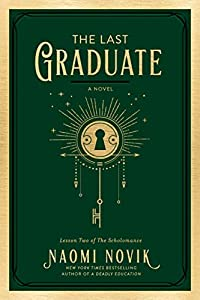
I haven’t tried the Scholomance series yet, but I have to admit it does sound like fun. I don’t mind the idea of a high body count as long as the tone of the story is light. Yaron commented the death and violence and gore and violence are much more… cartoonish? in this series, and that is the tone I mean. Anyway, the first book is only $2.99, and I picked it up. I kind of forgot that it’ll probably turn up in the Hugo voter’s packet or I would have waited, but as I say, it was inexpensive, so whatever.
But this did make me think of a perennial topic — second books that are as good as the first.
It’s a cliché that second books — second books in particular, not just sequels in general — are often weak. There are lots of reasons for that, although the one that gets cited the most is: The author had all the time in the world to polish the first book, but then suddenly there’s a contract with a deadline and the second book has to be written in a hurry. That certainly makes sense, particularly if the author wasn’t thinking about sequels until the contract asked for one.
In addition, the first book in a trilogy always has the pleasure of getting to know the characters and the world, while the third always has the ultimate climax. The second book is … well, it’s in the middle.
However, there are also quite a few counter examples. I’m sure I’ve done posts on this before, but probably not for a while, and I know I’ve read more books since then, so let’s try it again. I do want to try to stick specifically to second books of trilogies. What are some trilogies, trilogies specifically, where the second book is as good as, or even better than, the first book of the series? I have some contenders and I’m sure you all will think of others.
In no particular order:
1. Catching Fire in the Hunger Games trilogy. I started off by thinking, Oh, this again? and not feeling like the story was doing anything new. Then it did something new, as we pull back from Katniss’ individual story to the broader story that surrounds her. I wound up liking this book a lot. I’d set The Hunger Games and Catching Fire as about equal, while I had some problems with the ending of the trilogy and therefore tend to put Mockingjay down several rungs from the first two books of this trilogy.
Days of Blood and Starlight in Lani Taylor’s Smoke and Bone trilogy. This is one of the very (very) few high-angst YA fantasy trilogies that really works for me. That’s because Taylor is just such a great writer. In this case, the second book is independent enough to make a satisfying second book, even though its also inextricably a part of the overall story.
What is it with publishers redesigning books so that the covers are much worse than they used to be? Honestly, what is WITH these new covers? Let me just pause for a moment. Pick a cover:
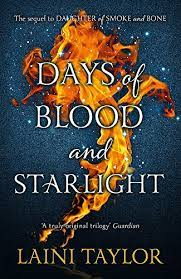
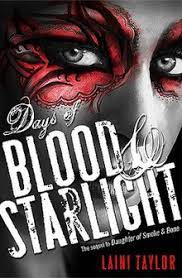
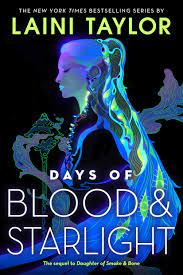
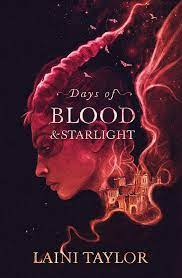
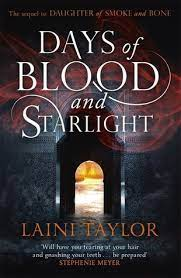
Okay, which is your least favorite? For me, it’s the blue one in the middle of the series. Guess which one is the current cover? Yep, that’s the one. I think I like the last two the best, but I live every single cover here better than the blue one in the middle.
But FINE, moving on.
2. The Demon’s Covenant by Sarah Rees Brennan is my next pick. Every book in this trilogy is excellent. The second might actually be my favorite, sometimes, in some ways, but it’s hard to choose. Sure, I don’t like certain details, but hello, it’s a whole trilogy, of course I dislike certain elements. Each book in the trilogy emphasizes a different pov protagonist, though there’s one overall plot. That’s a somewhat unusual structure. All the different points of view work about equally well for me, which is even more unusual. This is an intense story, rather dark — okay, quite dark in places — but overall this is a positive story. Obviously. You know me well enough to know I wouldn’t enjoy anything in the region of grimdark. Here are my more extensive comments about this series.
3. Like a River Glorious by Rae Carson. Here are my comments on the first two books of the trilogy, before the third was released. I don’t know that I ever commented on the third once it was out, but it was also really good. This is just a wonderful trilogy, with a strong through-line. Although readers might feel some section sags, I did not, and I think that feeling is more likely in the first book than the second. There’s a long slice-of-life journey west through the Great Plains — I guess I should say, this is a historical fantasy trilogy set during the Gold Rush, very heavy on the history and light on the fantasy. While sometimes a long journey can bore me, in this case, I enjoyed it and felt no need to skim ahead to the arrival in California
4. Two-Bit Heroes, the second book of Doris Egan’s (Jane Emerson’s) Ivory trilogy. Which, I’m sorry to say, do not appear to be available in ebook format, which is a crying shame. I loved these books when they were first published and I still love them, and I’m not sure whether the first or second book is my favorite. I’m still mad that Egan did not go on with this series. This was before an author could easily move into self-publishing, which is a real shame. The three mass-market paperbacks look like the more cost-effective option if you pick them up used: that would be Gate of Ivory, Two-Bit Heroes, and Guilt-Edged Ivory. Honestly, even if you never read paper editions of anything, these are well worth picking up your reading glasses.
5. Gemina, the second book of the Illuminae files by Kaufman and Kristoff. It’s hard to think of a more fun trilogy out there. Really delightful, exciting, a bit over the top … okay, thoroughly over the top. But so much fun! I’m sure by the end, readers are very sure that no matter what SEEMS to be happening, everything will turn out well. And it does, no matter what violence Kaufman and Kristoff have to do to their world to make sure of it.
For this trilogy, I have to suggest that the print version is the way to go simply because of all the weird print effects.
6. Ancillary Sword. I know some people found Ancillary Sword disappointing after Ancillary Justice. I didn’t have that reaction at all. It’s a story that happens in a smaller scale, that’s true. I liked that feature of the story. I liked and admired almost everything about this trilogy, but for me, the second book was better than the first. The central problem Breq needed to deal with in the second (and third) books appealed to me more than the central problem of the first book; and some of my favorite characters didn’t appear till the second book, and really, overall, the second books is right up there for me.
7. Paladin of Souls in the Five Gods world. If you take the three novels as a trilogy, with the Penric novellas treated as associated content, then I think the first book is the best, the second is almost as good, and the third is much less good. I know a lot of readers put the second book at the top for this trilogy and I get that, though for me it’s impossible to beat Caz in The Curse of Chalion. But I think most people agree that Paladin is right up there in quality.
I’m now going to cheat:
And, take a look, the whole trilogy is listed for $1.99 at the moment. Hatchette does that periodically. So seriously, this is the time to click through and buy this trilogy. And when you do, I will just say up front, the second book is my personal favorite. It’s not even close. I had the worst time coming up with a plot and a protagonist for this book — everything that occurred to me was YA — so I finally said, “Fine, you know what, the protagonist is a 42-year-old man” and went on from there. THAT broke it out of YA mode in a hurry, after which, as I say, it turned into one of my favorites. I really like Gereint … and Beguchrin … and Tehre … and here we are, with a story I truly enjoyed writing and still enjoy years afterward.
9. Tarashana
The main trilogy is Tuyo – Tarashana – Tasmakat. Everything else is offset from that trilogy. That makes Tarashana the second book of a trilogy.
I do not, of course, expect every single reader to agree, but I think Tarashana is just about as good as Tuyo. Sure, you only get the big reveal once. Nevertheless.
The cover for Suelen is in progress, by the way. I’ve seen two drafts. Hopefully I’ll be showing the final version to you by the end of the week. I’ll put Suelen up for preorder as soon as the cover’s ready. I’m going to schedule it for release about June 25th, I expect.
But! That turns out to be nine second books! Leaving:
10. Your Suggestion Here
What’s another second book of a trilogy that stands out for you? Something that’s close to as good as, maybe even better than, the first book? I’m sure there must be plenty of other trilogies where the quality doesn’t drop off dramatically in the second book.
Please Feel Free to Share:






The post Second books in trilogies: The Good Ones appeared first on Rachel Neumeier.
 newest »
newest »




Six of Crows by Leigh Bardugo
A Court of Thorns and Roses by Sarah J. Maas
Sevenwaters by Juliet Marillier
The Winternight Trilogy by Katherine Arden
The Kingkiller Chronicles by Patrick Rothfuss